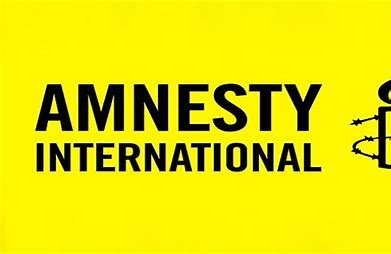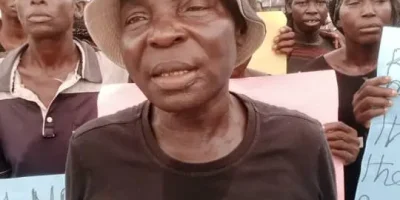By Bisi LAWAL
A report released by Amnesty International, AI, yesterday, raised global concern on the state of human rights in Nigeria and other countries.
The report tagged ‘The State of the World’s Human Rights: April 2024’ basically focused on sanctions against the media and criminal charges against journalists for alleged defamation; Defence and security forces use of excessive force; Torture during police interrogation; Forced evictions by authorities; Failure by authorities to put in place measures to mitigate Climate change impacts; Armed conflict actors’ violations of international law.
Others are Documentation of cases of enforced disappearances; Sexual and gender-based violence; Men charged under the Same-Sex Marriage Prohibition Act; Lack of sufficient food and access to basic amenities by resettled internally displaced people.
According to AI, the report documents human rights concerns during 2023 in 155 countries, connecting issues at global and regional levels and looking forward to the implications for the future.
States and armed groups are breaking and bending the rules of war and racism lies at the heart of some armed conflicts and the responses to them. Economic crises, climate change and environmental degradation have disproportionately affected marginalized communities.
Human rights defenders campaigning for the rights of these communities are targeted as part of a wider repression of dissent.
The backlash has intensified against the rights of women and girls and LGBTI people. Incitement to hatred and other harmful content posted online against some racialized groups have increased. Meanwhile, advances in artificial intelligence are used to limit freedoms and violate human rights.
The report reads in part, “There were sanctions against the media and criminal charges against journalists for alleged defamation.
“Defence and security forces used excessive force, mainly to disperse protests. People were tortured during police interrogation. Authorities continued to carry out forced evictions. Authorities failed to put in place measures to mitigate the impact of climate change.
“All parties to the armed conflict committed violations of international law. Cases of enforced disappearances were documented. Sexual and gender-based violence remained rife. Men were charged under the Same-Sex Marriage Prohibition Act. Resettled internally displaced people lacked sufficient food and access to basic amenities.”
On the burning issue of Freedom of Expression, AI’s report referred to 14 March, which “the National Broadcasting Commission (NBC) fined 25 stations over their coverage of the 2023 general elections for allegedly breaching the broadcasting code.
“On 1 April, the NBC fined Channels Television NGN 5 million (USD 6,540) over views expressed by the Labour Party vice presidential candidate, Datti Baba-Ahmed, during a TV programme. However, on 10 May, the Federal High Court in Abuja barred the NBC from imposing fines on broadcast stations.
Also according to the report, “On 18 March Chude Franklin Nnamdi, a Labour Party supporter, was arrested by police in Onitsha, Anambra state, for alleged cyber stalking – in contravention of section 24 of the Cybercrimes (Prohibition, Prevention, etc) Act, 2015 – over his criticism on social media of Charles Soludo, the Governor of Anambra state.
“On 18 August, the authorities withdrew accreditation from 25 journalists and media houses, excluding them from covering activities at the presidential villa in Abuja, on vague grounds of “security concerns and overcrowding of the press gallery area”.
“On 7 October, the NBC issued Arise TV “a final warning” for airing a programme containing “unguarded incendiary remarks against the Legislature, Executive, Judiciary and Mr President.”
The report alleged that, “On 1 November, police – in collusion with the Imo State government – beat and blindfolded Joe Ajaero, president of Nigeria Labour Congress, during a protest in Owerri municipality over workers’ unpaid salaries and pensions.”
Specifically on journalists’ ordeal, the report showed that, “The authorities continued to clamp down on journalists and use criminal sanctions for “defamation”.
It reads thus, “In January, Agba Jalingo faced criminal charges for alleged defamation of a relative of Ben Ayade, former governor of Cross River state. On 7 February, investigative journalists Gidado Yushau and Alfred Olufemi were convicted of conspiracy and defamation over a report on drug abuse in Kwara state.
“On 18 April, a police officer physically assaulted Benedict Uwalaka, a photojournalist, for covering a protest by aviation union members in Lagos State.
“Prisoner of conscience Omoyele Sowore continued to face bogus treason charges at the Federal High Court in Abuja for calling for #RevolutionNow protests in 2019.”
On the issue of Unlawful attacks and killings, the report accused security forces of using excessive force, including in the dispersal of peaceful protests and assemblies.
“On 5 April, a police officer shot dead Onyeka Ibe for refusing to pay a NGN 100 bribe (USD 0.13) in Delta State. On 29 June, soldiers shot dead three youths protesting at extortion and underemployment in Afokpella community in Etsako local government area, Edo state.
“A leaked government memo dated 19 July indicated that the Lagos state government had in its possession the bodies of 103 people killed during the #EndSARS protests in October 2020, and had approved their secret mass burial.
“On 10 October, the Lagos state government announced the suspension of the burial.
“On 6 September, armed police officers teargassed and used excessive force on University of Lagos students protesting against an increase in tuition fees from NGN19,000 (USD 24.76) to NGN 190,000 (USD247.65). Olorunfemi Adeyeye and six other students were arrested, beaten and threatened with death by police.
“On 9 October, police officer Drambi Vandi was convicted in the High Court in Lagos state for the murder of Omobolanle Raheem, who he shot dead on 25 December 2022 on the Lekki-Epe road after trying to stop her car. He was sentenced to death by hanging.
“Torture and other ill-treatment; On 30 July, Faiz Abdullahi died in police custody in Kaduna, Kaduna state, after being tortured during interrogation. Abdullahi Tukur Abba, a 17-year-old student, died in hospital following torture during interrogation after he was picked up by police on 5 August in Yola, Adamawa State.”
Economic, Social, and Cultural rights was also one of the focal areas contained in the report; “On 29 May, President Bola Tinubu announced the removal of the fuel subsidy, leading to a steep rise in food prices and the cost of living.
“On 2 August, the Nigeria Labour Congress went on strike over issues including low wages and the eight months’ non-payment of salary for university teachers. On 1 October, President Tinubu announced a temporary. The State of the World’s Human Rights 285 monthly minimum wage increase of NGN 25,000 (USD 31). “
Another area the report spotlighted on was Forced evictions; “The authorities continued to forcibly evict residents, without adequate notice or compensation or making alternative resettlement plans, rendering hundreds of people homeless.
“On 21 and 22 May, security agents and the Kaduna State Urban Planning and Development Authority demolished structures belonging to supporters of the Islamic Movement of Nigeria. On 27 July, over 12,000 people were rendered homeless and over 250 houses were demolished in communities in Oworonshoki, Lagos State.”
Another worrisome phenomenon, the report focused on was attacks on educational institutions.
“The Nigerian state failed to protect educational institutions from attacks and abductions.
“In January, gunmen abducted six pupils, aged four to six years, from LGEA Primary School in Alwaza, Nasarawa state. In March, herders attacked the Community Grammar School in Alaropo Nla, Oyo state, injuring pupils and teachers. On 22 September, gunmen abducted 30 schoolgirls from their hostels at the Federal University of Gusau, Zamfara state.
“On 4 October, gunmen attacked Federal University Dutsin-Ma in Katsina state and abducted five female students.
“On 9 October, gunmen abducted four female students – Rahila Hanya, Josephine Gershon, Rosemary Samuel and Goodness Samuel – at the Nasarawa State University in Angwan Ka’are community, Nasarawa state.”
On violence against women and girls, the report quoted, “According to the Minister of Women Affairs, as of October there were 24,720 reported cases of sexual and gender-based violence during the year, including 975 deaths. On 15 June, an eight-month pregnant woman was raped by John Akpo at Irabi, Benue State. On 22 June, the police arrested Chukwuemeka Orji for raping a 13-year-old domestic worker in Aba, Abia State.
“On 14 July, the mutilated body of 32-year old Dorcas Shangev was found in Makurdi, Benue State. On 15 July, 27-year-old Chinyere Awuda was beaten to death and dumped in an abandoned hotel pool in Awka, Anambra State.
Meanwhile, according to AI, unlawful attacks and killings of security forces were recorded during the period under review.
“Defence and security forces committed human rights violations during their operations against armed groups.
“On 24 January, an air strike by a suspected Nigerian air force drone killed dozens of civilians in Rukubi Local Government area, Nasarawa State. On 25 January, at least 21 civilians were killed in an air strike by the 286 The State of the World’s Human Rights Nigerian air force in Niger State.
“In September, security forces attacked Umualumaku community in Ehime Mbano Local Government Area, Imo State, setting several houses and vehicles ablaze, in reprisal over the killing of members of the Nigeria Security and Civil Defence Corps, police and army. On 3 December, Nigerian military air strikes killed over 120 people attending a religious ceremony at Tudun Biri village, Kaduna State.”








Comments